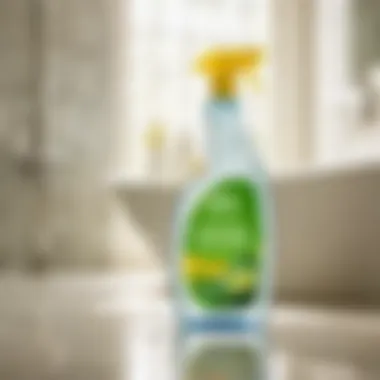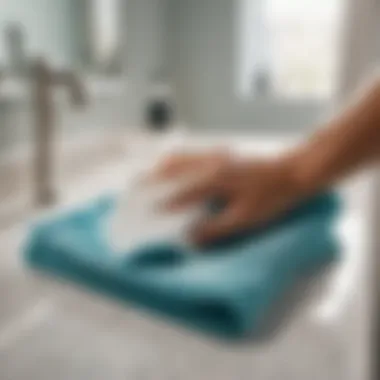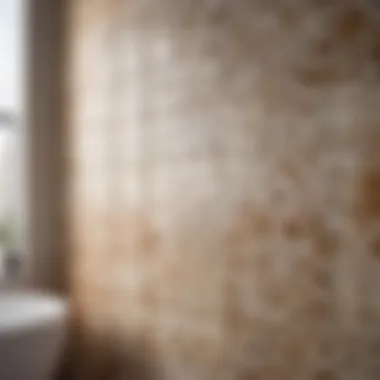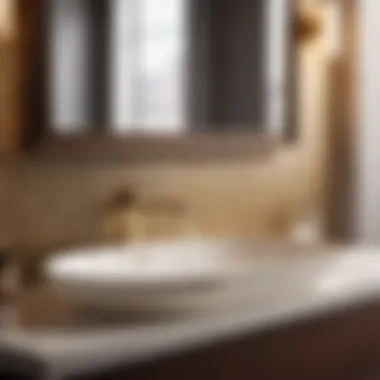Discover the Best Bathroom Cleaner for Hard Water Stains - Expert Guide


Materials:
- 1.5 cups of white vinegar
- 1 cup of baking soda
- 1 tablespoon of dish soap
- 1 spray bottle
- 1 scrub brush
- 1 microfiber cloth
DIY Steps:
- Combine the white vinegar and dish soap in the spray bottle.
- Shake the mixture well to ensure it is thoroughly mixed.
- Sprinkle baking soda on the affected hard water stains in your bathroom.
- Spray the vinegar and dish soap mixture over the baking soda until it forms a paste.
- Let the paste sit for 15-20 minutes to break down the stains.
- Use the scrub brush to gently scrub the stains to lift them off.
- Rinse the area with water and wipe it clean with a microfiber cloth.
- Admire the sparkling clean surface!
Technical Aspects:
- The cleaning process should ideally be done in a well-ventilated area.
- Ensure to wear gloves to protect your skin from the cleaning agents.
- The scrub brush should have firm bristles to effectively remove tough stains.
- Allow the paste to sit for the recommended time to achieve optimal results.
DIY project Process:
- Start by preparing the cleaning solution as per the outlined measurements.
- Apply the paste carefully on the hard water stains, covering them thoroughly.
- Follow the specific timings for each step to ensure maximum effectiveness.
- If the stains are stubborn, repeat the process or let the paste sit longer.
- Troubleshooting Tips: If the stains persist, increase the vinegar concentration for tougher cleaning.
- Enjoy your gleaming, spotless bathroom!
Understanding Hard Water Stains
Understanding hard water stains is crucial in the context of selecting the best bathroom cleaner for hard water. Hard water stains are a common issue in many households, caused by the high mineral content in water. These stains can leave unsightly marks on bathroom surfaces, making them challenging to clean. By delving into the causes and impacts of hard water stains, homeowners can make informed decisions when choosing the most effective cleaning solutions.
Causes of Hard Water Stains
Mineral Deposits
Mineral deposits are one of the primary culprits behind hard water stains. These deposits consist of minerals like calcium and magnesium that precipitate out of the water and adhere to surfaces. The key characteristic of mineral deposits is their stubborn nature, making them difficult to remove with regular cleaners. Despite their tough-to-clean nature, mineral deposits can be effectively targeted with the right bathroom cleaner formulated to break down these minerals.
Calcium and Magnesium Build-up
Calcium and magnesium build-up contribute significantly to hard water stains in bathrooms. These minerals accumulate over time, forming crusty deposits on fixtures and surfaces. The key characteristic of calcium and magnesium build-up is their ability to bond strongly to surfaces, requiring specialized cleaners to dissolve them effectively. While challenging to tackle, the unique feature of these mineral build-ups is that they can be prevented with regular cleaning and the use of appropriate cleaning products.
Impact on Bathroom Surfaces
Hard water stains can have a detrimental impact on bathroom surfaces, affecting both appearance and longevity.


Tile Discoloration
Tile discoloration is a common consequence of hard water stains, causing tiles to lose their original shine and color. The key characteristic of tile discoloration is the gradual layering of mineral deposits on the tile surface, resulting in an unsightly appearance. While challenging to address, tile discoloration can be overcome with targeted cleaning agents designed to dissolve and remove hard water stains effectively.
Scale Build-up
Scale build-up is another significant issue arising from hard water stains, leading to the accumulation of mineral deposits on faucets, showerheads, and other bathroom fixtures. The key characteristic of scale build-up is its propensity to clog pipes and fixtures, affecting water flow and functionality. Despite its adverse effects, scale build-up can be managed through regular cleaning routines and the application of suitable cleaning products tailored to combat hard water stains.
Factors to Consider When Choosing a Bathroom Cleaner
When it comes to selecting the right bathroom cleaner for hard water stains, several crucial factors should be taken into consideration to ensure optimal results and maintain a sparkling bathroom. The chemical composition of the cleaner plays a significant role in its effectiveness. Understanding the specific elements and benefits of different cleaners can help housewives and homeowners make informed decisions regarding their cleaning routines.
Chemical Composition
Acidic vs. Non-Acidic Cleaners
As one of the key considerations in choosing a bathroom cleaner, the debate between acidic and non-acidic cleaners is pivotal. Acidic cleaners, containing ingredients like vinegar or citric acid, are highly effective in breaking down mineral deposits and tough stains caused by hard water. On the other hand, non-acidic cleaners offer a milder approach, making them suitable for regular maintenance without causing damage to surfaces. The acidic nature of these cleaners enables them to dissolve calcium and magnesium buildup with ease, ensuring a deep and thorough clean.
Eco-Friendly Options
In the realm of bathroom cleaners, eco-friendly solutions are gaining popularity due to their environmentally conscious formulations. These options prioritize sustainability and health by utilizing natural ingredients that are biodegradable and non-toxic. Housewives and homeowners looking to minimize their carbon footprint can benefit from eco-friendly cleaners that not only combat hard water stains effectively but also contribute to a greener, healthier home environment. By opting for eco-friendly options, users can achieve a spotless bathroom without compromising on safety or sustainability.
Effectiveness Against Hard Water Stains
Lime Scale Removal
One of the primary challenges posed by hard water stains is lime scale, which can accumulate on bathroom fixtures and surfaces over time. Effective bathroom cleaners targeted at lime scale removal offer solutions to this persistent issue. These cleaners are specially formulated to dissolve tough mineral deposits, restoring the shine to faucets, showerheads, and tiles. By incorporating a lime scale removal cleaner into their routine, housewives and homeowners can prevent the buildup of unsightly deposits and maintain the luster of their bathroom surfaces.
Soap Scum Dissolving
Another common consequence of hard water is the formation of soap scum, which can dull the appearance of showers and tubs. Choosing a bathroom cleaner with potent soap scum dissolving properties is essential for combating this greasy film effectively. These cleaners break down soap residue and body oils, ensuring a thorough cleanse that leaves surfaces gleaming. By investing in a quality soap scum dissolving cleaner, homeowners can enjoy a fresh and hygienic bathroom free from unsightly residue.
Safety Considerations
Non-Toxic Ingredients


Prioritizing the safety of household members and the environment, opting for bathroom cleaners with non-toxic ingredients is a wise choice. These cleaners are free from harmful chemicals like chlorine and ammonia, making them gentle yet powerful in tackling hard water stains. By choosing non-toxic cleaners, housewives and homeowners can provide a safe cleaning environment for their families, especially in households with children or pets.
Skin-Friendly Formulas
Considering the frequent interaction with surfaces being cleaned, the formulation of bathroom cleaners plays a crucial role in ensuring skin-friendliness. Cleaners with skin-friendly formulas are gentle on hands and prevent irritation or dryness. By selecting products designed to be safe for skin contact, users can clean their bathrooms with peace of mind, knowing that their skin is protected. Skin-friendly formulas offer a balance between effective stain removal and maintaining skin health, perfect for daily cleaning routines.
Types of Bathroom Cleaners
When it comes to tackling hard water stains in your bathroom, choosing the right cleaner is crucial. Understanding the different types of bathroom cleaners available can significantly impact the effectiveness of your cleaning routine. From spray cleaners to gel cleaners and even DIY options, each type offers unique benefits and considerations tailored to address hard water stains.
Spray Cleaners
Spray cleaners are a popular choice for many homeowners due to their convenient application. The ease of use and quick application process make them ideal for regular cleaning maintenance. With their ability to cover large surface areas efficiently, spray cleaners ensure thorough cleaning without the need for extensive scrubbing.
Convenient Application
The convenient application of spray cleaners allows for effortless cleaning of hard water stains. Simply spray the cleaner on the affected areas, let it sit for a few minutes, and wipe away the stains with ease. This time-saving feature makes spray cleaners a top choice for busy individuals looking to maintain a sparkling bathroom effortlessly.
Quick Results
One of the key characteristics of spray cleaners is their ability to deliver quick results. Thanks to their fast-acting formulas, spray cleaners effectively dissolve hard water stains, lime scale, and soap scum without prolonged waiting times. This makes them an efficient and reliable option for tackling stubborn bathroom stains.
Gel Cleaners
Gel cleaners, known for their thicker consistency, offer targeted cleaning solutions for hard water stains. The gel-like texture adheres well to vertical surfaces, allowing for better coverage and prolonged contact time to break down tough stains.
Thicker Consistency
The thicker consistency of gel cleaners ensures better adhesion to surfaces, especially on shower walls, tiles, and other vertical areas prone to hard water stains. This unique feature allows the cleaner to cling to surfaces, effectively penetrating and lifting away mineral deposits and soap scum.
Targeted Cleaning
With their ability to target specific areas, gel cleaners are ideal for spot treating hard water stains. Whether it's a concentrated application on faucets or shower doors, the precision offered by gel cleaners makes them a valuable tool in addressing localized stains with precision and efficiency.
DIY Cleaners


For those looking for natural and eco-friendly cleaning alternatives, DIY cleaners provide a homemade solution to combat hard water stains. By utilizing common household ingredients, DIY cleaners offer a cost-effective and chemical-free approach to maintaining a clean and hygienic bathroom environment.
Natural Ingredients
DIY cleaners harness the power of natural ingredients such as vinegar, baking soda, and essential oils to create effective cleaning solutions. These ingredients not only dissolve hard water stains but also disinfect and deodorize the bathroom naturally, promoting a healthier indoor environment.
Homemade Formulas
Creating homemade formulas gives homeowners the flexibility to tailor the cleaner to their specific cleaning needs. Whether it's adjusting the scent with essential oils or tweaking the formula for tougher stains, DIY cleaners offer a customizable approach to cleaning hard water residues, ensuring a personalized and effective cleaning experience.
Best Practices for Cleaning Hard Water Stains
Preparation
Ventilation
Ventilation plays a crucial role in the cleaning process as it helps in dissipating fumes and ensuring proper air circulation during cleaning activities. Proper ventilation not only aids in maintaining a comfortable environment but also reduces the concentration of cleaning agents in the air, promoting a safer cleaning experience. By incorporating adequate ventilation measures, such as opening windows or using exhaust fans, you can create a more pleasant and healthier cleaning atmosphere in your bathroom.
Protective Gear
Protective gear is an essential component when it comes to cleaning hard water stains. Wearing gloves, masks, and goggles can safeguard your skin, respiratory system, and eyes from potentially harmful chemicals present in cleaners. The protective gear acts as a barrier, preventing direct contact with corrosive substances, thus minimizing the risk of skin irritations or respiratory issues. While protective gear adds an extra layer of safety, it is essential to choose appropriate gear that fits well and provides adequate protection without hindering your movements.
Application Techniques
Dwell Time
Dwell time refers to the period a cleaning agent remains in contact with a surface before being wiped or rinsed off. Allowing sufficient dwell time enables the cleaner to break down tough stains effectively, making them easier to remove. This technique is particularly beneficial when dealing with stubborn hard water deposits as it ensures thorough cleaning and prevents the need for excessive scrubbing, reducing the risk of surface damage.
Scrubbing Methods
Effective scrubbing methods are key to achieving a spotless bathroom free from hard water stains. Selecting the right scrubbing tools, such as non-abrasive pads or brushes, paired with suitable cleaning techniques can make a significant difference in stain removal. Gentle yet firm scrubbing motions help dislodge residue without causing damage to surfaces, ensuring a thorough cleaning process without sacrificing the integrity of your bathroom fixtures.
Maintenance Tips
Regular Cleaning Schedule
Implementing a regular cleaning schedule is vital in preventing the buildup of hard water stains in your bathroom. Consistent cleaning sessions, whether weekly or bi-weekly, help to tackle minor stains before they become stubborn deposits. By staying on top of your cleaning routine, you can maintain a pristine bathroom environment and reduce the effort required for deep cleaning sessions.
Preventing Future Build-up
In addition to regular cleaning, adopting preventive measures can aid in minimizing future hard water stains. Installing a water softener or using distilled water for cleaning purposes can reduce the mineral content in water, leading to fewer deposits on surfaces. Furthermore, wiping down wet surfaces after each use and using squeegees on glass surfaces can prevent water spots and residual minerals, prolonging the cleanliness of your bathroom.







